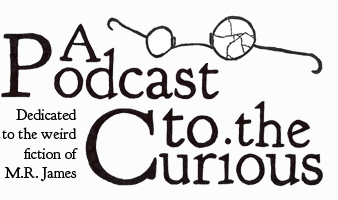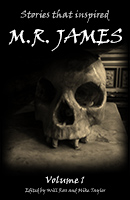The next story we will be covering is ‘Martin’s Close’ by M.R. James, and although in the story it is simply described as ‘a parish in the west’, James later admitted in the introduction to the 1931 Complete Ghost Stories that the location that inspired the story was Sampford Courtney in Devon.
Could we resist the temptation to pop down to Devon and have a snoop around? We could not.
We will provide more details on what we found in the fourthcoming episode on Martin’s Close, including mentions of King’s College inside the church, names used by James in the story found on gravestones and suspicious looking pools of water just outside the village!
The highlight of the trip was a visit to the New Inn, the pub which features in some of the more scary moments from the story, where we interviewed Malcomn the landlord who was a goldmine of information on all the ghostly happenings in the inn and local area.
We will be talking about our trip in greater detail in the next episode of the podcast, which will hopefully by out by next weekend.
Tags: A Visit to Martin's Close, Devon, M.R. James, Martin's Close, New Inn, Sampford Courtney, Video







Haha! That looked really cool! A sleepy and creepy little village, adjacent crumbling churchyard and beautiful countryside.
Diggin’ the music, too, guys!
Thanks! I can’t take credit for the music used though, it was ‘St Suliac/Sur La Rance’ by Nigel Eaton.
No-one will know-you can say you did it.
Wotcha, you two reprobates!
This post has absolutely nothing to do with the video above (enjoyable though it is), I just thought I’d drop a line to voice my appreciation of the podcast in general. Although you’ve admitted to borrowing the format, you have one great advantage over the hosts of HPPodcraft – James is actually the superior writer.
Whereas Lovecraft tried and failed to evoke a sense of the truly uncanny in his fiction (The Music of Erich Zann being one moment when he rose above hackdom), James hits the spot far more than he misses. His later work may well be considered less accomplished than his earlier efforts, yet it still towers head, shoulders and cob-webbed eyes above the opposition. No-one, I think, has better captured the feeling of a universe askew in their fiction, of an individual setting forth beyond the doorstep and encountering a reality which has shifted ever-so-subtly beyond that which can be redeemed.
Another bonus, and one which separates your podcast from a multitude of others, is that you both gel well together. Too many shows I’ve heard suffer from false bonhomie, but you two make engaging hosts and the banter you engage in is as much a draw as your dissection of the stories.
(As an aside, and because I’ve waffled far more than I meant to, the shownotes are excellent too and have vastly improved my appreciation of MRJ’s universe.)
Keep up the good work, guys. I may occasionaly disagree with the conclusions you draw, but it’s always an enjoyable ride getting there.
james is the superior literarian, while lovecraft has the superior imagination. in the long term, lovecraft has been more influential due to his focus on extraterrestrial intelligences (see ‘alien’, ‘the thing’, ‘prometheus’.
I’d have to disagree with you, Revenant.
Whereas James is regarded as the best English ghost story writer of all time (and rightly so), Lovecraft is far more influential for a reason. He managed, despite your view of him as a ‘hack’, to create a universe of characters, places and horrors which have been successful up to this very day, whilst James has largely gone unnoticed in the field of horror literature.
Lovecraft never intended to evoke the ‘uncanny’, but the wholly alien, the hidden horrors lurk beneath the surface of humankind’s pitifully short sighted view of a reality brimming with alien forms and dimensions whose hinted existence has driven those who find them to madness. He brought horror out of the supernatural and into our physical world. Gone are the ghosts, vampires and demons of the past – in their stead exist fungous crustaceans, time-hopping intelligences and incomprehensible aliens mistaken as gods. There is no spirit plane, only the coldness of space. ‘At the Mountains of Madness’ is an entire demythologization of the creation myth of humanity; we’re an unintended side-effect of an experiment, left to exist simply because we’re not a nuisance. As masterful as he was (there is no doubt he was a master of his craft), James still clung to past conventions. He depicted a generally English micro-verse of ghosts and elemental creatures.
You are, of course, entitled to your own opinion, but you ought to consider that some things are successful for a reason, and perhaps read deeper into what certain Providence pulp writers were really up to.